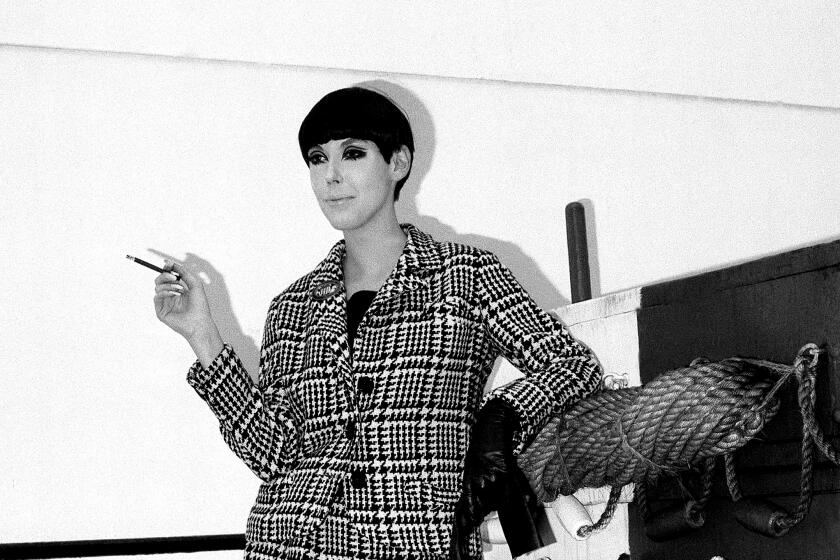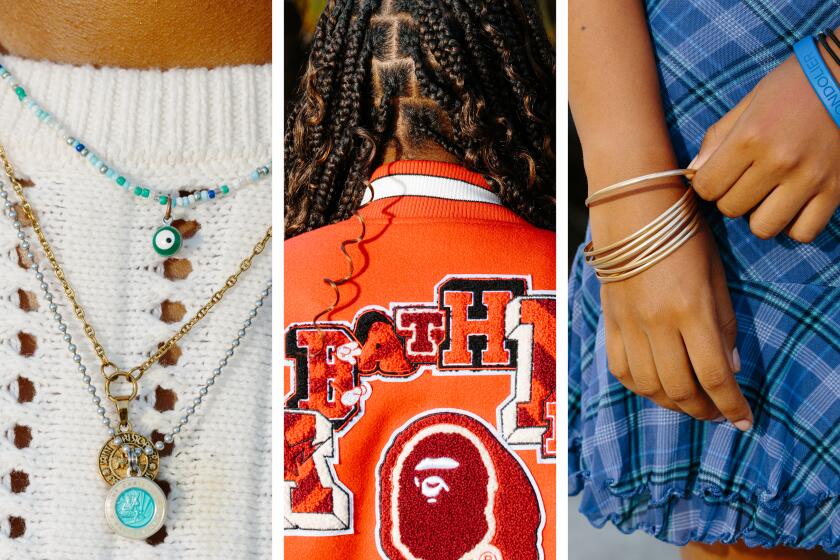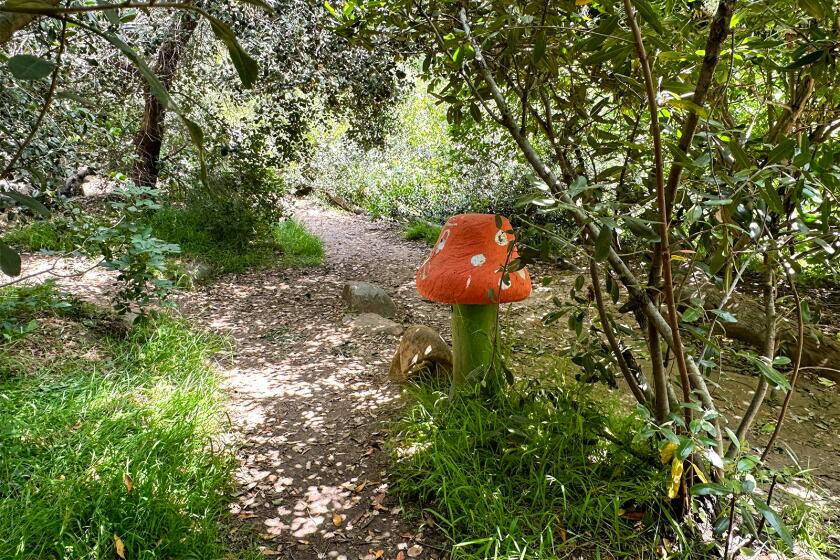Encyclopedic Botanicas : Need Some ‘Evil Go Away’ Oil? It’s Probably at a Santeria Near You
Dressed in a blue gingham dress, kerchief and flip-flops, a life-size mannequin representing an ancient African spirit sits in the corner of Botanica San Jose, keeping watch over the shop.
Nearby, a 4-foot statue of Lazarus, patron of the sick and poor, hangs in the window. On the counter two candles burn--one for Lazarus, the other for St. Simon, a Catholic saint and one of the 12 apostles.
“The spirits are friends of mine,” shop owner Carmen Mujica said in Spanish, referring to her statues and idols. “They bring me good luck for business.”
It seems to be working.
When Mujica opened her cluttered botanica--a store that caters primarily to those who practice the Santeria faith, a blend of West African religions and the worship of Roman Catholic saints--it was one of two on Pacific Boulevard in Huntington Park. Eight others have opened and closed since then. Today, she competes with five botanicas within a two-block radius. Four of those opened in the last four years.
From Sunset Boulevard to Cesar Chavez Avenue, these closet-sized stores are springing up. Although Los Angeles ranks third among U.S. cities in the number of people who practice Santeria, it has more botanicas than any other U.S. city--roughly 1,000, according to a nationwide distributor of botanica items.
Five years ago, 28 botanicas advertised in Pacific Bell’s Greater Los Angeles yellow pages. Now there are 52 listings for shops that sell everything from $2 pink “love” candles to garlic crosses for luck to “Evil Go Away” oil. There are soaps to help you study and shells that are supposed to forecast your future.
When distributor Michael Orta opened his Huntington Park wholesale warehouse in 1983, he sold these and other imported Santeria items to about 200 botanicas in Los Angeles. His business has more than quadrupled since then, he said. In the last five years alone, he estimates he has added 350 clients.
Salsa music plays in the background at his Saydel Inc. warehouse, where customers shop for bull’s horns, crucifixes and beaded necklace.
“Business is going so well,” Orta said. “There’s a large demand for this. Our business is increasing significantly, and it’s still on the rise.”
The spread of Santeria is fueling the growth of botanicas, according to store owners, Santeria priests and scholars. What once was considered a mysterious practice is making its way into mainstream culture.
In 1990, about 50,000 people practiced Santeria in Los Angeles, according to a City Council study. Scholars and Santeria priests estimate that number has doubled, ranking Los Angeles behind New York and Miami in the number of Santeria practitioners.
“It’s an expanding religion,” said Patrick Polk, archivist of the Folklore and Mythology Program at UCLA. “There’s no doubt that the faith is growing. People are always looking for religious practices that speak to them. A lot of Anglo Americans are becoming practitioners.”
*
Santeria, which is Spanish for “the worship of the saints,” developed in the 18th century in Cuba when missionaries attempted to convert African slaves to Catholicism. The slaves worshiped the saints to appease their owners and avoid punishment, but they secretly placed their traditional idols behind the statues of Virgin Mary or John the Baptist.
Through immigration, the religion made its way to Los Angeles. It continues to grow as second and third generations return to their roots and outsiders discover the religion.
“It appeals to a broad base of people,” Polk said. “It’s particularly unlike a lot of the organized religions. It’s very much attuned to solving problems in daily lives. It’s the here and now. Can I find a lover? Where to find a job. How to cure this disease. It’s possible solutions to immediate, everyday problems, medical or spiritual.”
Dick Blitz, owner of Farmacia Million Dollar on South Broadway in downtown Los Angeles, is Jewish and doesn’t practice Santeria, but he began to sell religious candles 12 years ago because of customer demand. Now half the items he stocks are for his Santeria customers.
The majority of his customers are Latino, but Blitz said the store is serving more Anglos than ever before. Along with the typical pharmacy fare of shampoo, Advil and Q-Tips, the shop sells Santeria dolls, oils and herbs.
A 1993 U.S. Supreme Court decision that animal sacrifice, a ritual widely practiced in Santeria, is a religious act protected by the Constitution, has helped spur Santeria’s popularity. Until then, Los Angeles and many other cities outlawed the practice, forcing it underground.
“Before when you bought a candle, we’d put it in a black bag. People were in and out quick,” Orta said. “It’s not hidden anymore. That’s what’s driving business.”
In Panpipes Magickal Marketplace in Hollywood, among the canisters labeled “Bats’ hearts” and “Dragons’ blood,” owner George Hiram Derby stocks a wide variety of oils and herbs used in Santeria.
He said that when he opened his full-service occult shop 35 years ago, it was one of the few stores that openly carried Santeria items. Now it’s difficult for him to keep track of the botanicas in his neighborhood. “You drive down the street one day and there’s none. The next day, there’s three,” Derby said. “Every cubbyhole is a botanica. People who used to practice in their bedrooms are now opening stores. It’s amazing.”



